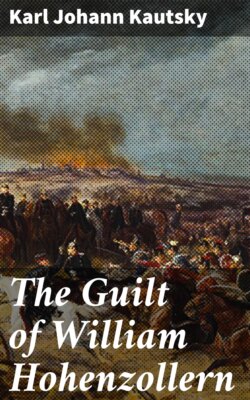Читать книгу The Guilt of William Hohenzollern - Karl Johann Kautsky - Страница 7
На сайте Литреса книга снята с продажи.
Оглавление
CHAPTER III
GERMAN PROVOCATIONS
Table of Contents
For the moment, German policy did not mean war with the whole world. It did, however, involve the danger of such a war. The stronger the encirclement, the more complete the isolation of Germany, the more necessary it became, in her own interests, to avoid any provocative action that might entangle her in war.
The Marxist who contends that imperialism would have brought about a war in any case, whatever policy Germany had pursued, is like one who should defend a pack of silly boys for amusing themselves by throwing matches into a cask of gunpowder. The boys, he maintains, are not to blame for the devastating explosion which followed their practices, it is the circumstance that there was powder in the cask. Had there been water in it, nothing would have happened. No doubt. But in our case the boys knew there was powder in the cask—they had put a good deal of it in themselves.
One might indeed say that the greater Germany's isolation, and the more threatening the danger of a world-war, the more her provocations increased.
The growing danger itself had the effect of intensifying the bitterness on both sides; it formed a new impulse towards the increase of armaments and thereby towards the strengthening of warlike influences. It fatally increased the number of those who believed war to be unavoidable, and who therefore urged that it should be let loose, as a preventive war, at the moment when circumstances were favourable to Germany and embarrassing to the enemy.
In Germany, step by step with her military preparations, grew also the confidence in her strength. This displayed itself in many circles as a veritable megalomania, basing itself on the history of Prussia, which for a century and a half had, with the exception of Jena, nothing but victories on its record.
The pan-German section in particular exceeded all bounds in the provocations it uttered. These were of serious significance, for the pan-Germans were the leading element in those circles of society which formed the ruling class in Germany and from which its Government sprang.
The mischief was still more increased by the personality of the Kaiser, whose mind was militarist through and through, and at the same time superficial, excessively vain, and devoted to theatrical effect. He never shrank from demonstrations and speeches of the most challenging kind when he believed that they would impress those around him.
We have already noted that in the days of the first Hague Conference he declared that, as against courts of arbitration and disarmament, a well-ground sword was the best guarantee of peace.
One year later (July 27th, 1900), when troops were embarking for China at Bremerhaven, he laid down the following beautiful principles of warfare:
“No quarter is to be given. No prisoners are to be made.... As the Huns under their King Attila made a name for themselves a thousand years ago... so now let the name of German go down in China for a thousand years, so that a Chinaman will never again dare even to look askance at a German.”
If later on, in the world-war, the German methods of warfare were set down to a system of cruelty thought out in cold blood, and Germans got the name of Huns, the German people have their Kaiser to thank for it.
While through such utterances the German people were made abhorrent in the eyes of all humane thinkers, William, at the same time, did not hesitate to fling down his challenge to the imperialists of other lands. He began in 1896 with his telegrams to the Boer president, Kruger, in which William at the outset of the conflict between England and the Boers assured the latter of his friendship.
Shortly afterwards, in 1898, he declared himself the patron and protector of the three hundred millions of Mohammedans in the world. That included the Mohammedans in French Algeria as well as those living under English rule in Egypt and India, the Mohammedans in Russia, and those whom Russia was threatening in Turkey.
It was merely a continuation of this policy of provocation when in Tangier in 1905, as France began to take an active interest in Morocco, William promised his support to the Sultan against anyone who should threaten his independence, and later, in 1911, in connection with the same dispute, suddenly sent a war-ship to the Moroccan harbour of Agadir.
On both occasions the peace of the world was endangered. The situation was not improved by the fact that always, when the time came for the threat to be made good, William lost courage and left in the lurch those to whom he had pledged his protection. Thus it was in Morocco, and thus, most discreditably, in the case of the Boers. And this contributed to add contempt to the hatred with which Germany was regarded.
In these conflicts the antagonists on both sides were imperialists. In the war of mighty England against the little Boer Republic, the public opinion of the whole civilized world had unanimously taken part with the smaller and weaker party. In the case of Morocco, the working classes of both Germany and France were fully agreed in opposition to their Governments, and contributed not a little to the maintenance of peace. And through this attitude of the Socialist proletariate, the incalculable, abrupt and provocative element in German world-policy was to some extent reduced.
